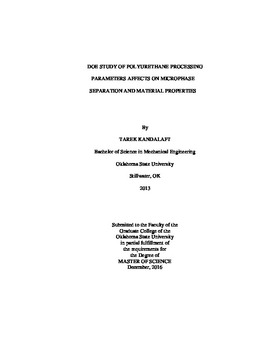| dc.contributor.advisor | Vaidyanathan, Ranji | |
| dc.contributor.author | Kandalaft, Tarek | |
| dc.date.accessioned | 2018-06-29T14:41:01Z | |
| dc.date.available | 2018-06-29T14:41:01Z | |
| dc.date.issued | 2016-12-01 | |
| dc.identifier.uri | https://hdl.handle.net/11244/300354 | |
| dc.description.abstract | In this study, a design of experiments (DOE) has been setup to better understand the effects of percentage of hard segment (%HS), mixing index, temperature, and environmental humidity on the microstructure development, tensile properties, and thermal properties of an MDI based poly(ester urethane) with 1,4 butane diol chain extender. Fourier transform infrared spectroscopy (FTIR) and differential scanning calorimeter (DSC) were utilized to better investigate the amount of microphase separation. Tensile testing was conducted to measure the elongation, tensile strength at break, and the resistance to tear. Finally, scanning electron microscopy (SEM) was used to examine any microstructure or superstructure development or phase separation. A DOE statistical regression analysis was completed to insure adequate sample sizes, low factor aliasing, and high statistical confidence and signal-to-noise (low p-value and high T-stat). Regression models are presented. Results indicate that the amount of hard segment had a large influence on hydrogen bonded carbonyl groups. However, these formations remained in amorphous state and did not form well structured, phase separated blocks. Results also show that the mixing temperature has a large effect on both tensile and tear strengths. Moreover, DSC results indicate a significant impact of mixing temperature on the crystallinity of the sample. A large second order interaction between relative humidity and the samples glass transition temperature has been observed. However, humidity effects were not detectable in FTIR spectrums. | |
| dc.format | application/pdf | |
| dc.language | en_US | |
| dc.rights | Copyright is held by the author who has granted the Oklahoma State University Library the non-exclusive right to share this material in its institutional repository. Contact Digital Library Services at lib-dls@okstate.edu or 405-744-9161 for the permission policy on the use, reproduction or distribution of this material. | |
| dc.title | Doe Study of Polyurethane Processing Parameters Affects on Microphase Separation and Material Properties | |
| dc.contributor.committeeMember | Singh, Raj | |
| dc.contributor.committeeMember | Smay, James | |
| osu.filename | Kandalaft_okstate_0664M_14918.pdf | |
| osu.accesstype | Open Access | |
| dc.description.department | Materials Science and Engineering | |
| dc.type.genre | Thesis | |
| dc.type.material | text | |
